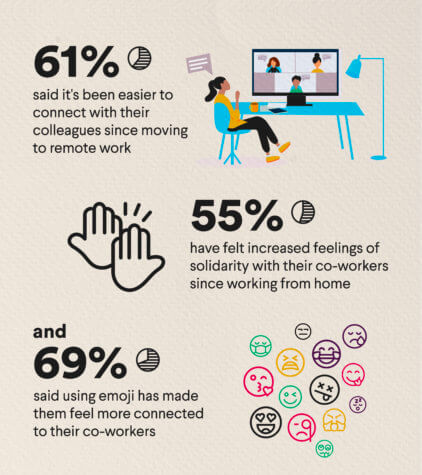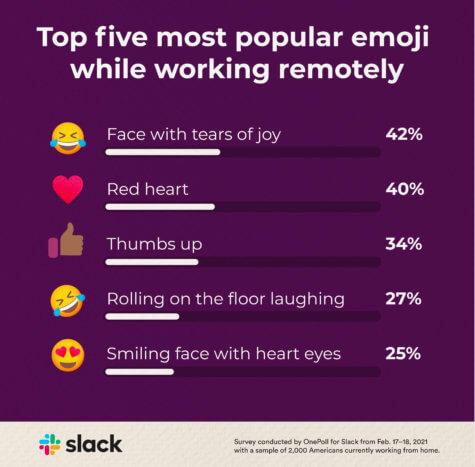NEW YORK — Did 2020 officially kill the email? According to many emoji-loving remote workers, it should have 😁.
A survey of 2,000 Americans currently working remotely reveals 50 percent have stopped sending as many emails since the start of the COVID-19 pandemic. Fifty-one percent claim it “crushes their soul” every time they get another email, with 43 percent saying their biggest complaint is that emails are a very formal and constraining way to communicate.
In addition to that, respondents said email makes it more difficult to prioritize tasks (39%) and they feel less connected to their colleagues when communicating through email (24%).
Is the world slowly phasing out emails?
 Conducted by OnePoll on behalf of Slack, the survey is part of a global study — in the U.S., United Kingdom, France, and Germany — which coincides with the one-year anniversary for many people who began working from home during COVID-19.
Conducted by OnePoll on behalf of Slack, the survey is part of a global study — in the U.S., United Kingdom, France, and Germany — which coincides with the one-year anniversary for many people who began working from home during COVID-19.
The survey delved into the ways in which communication has changed during the past 12 months. The results reveal that eight in 10 U.S. workplaces have adopted new communication tools since March 2020. As a whole, these are also more informal methods of talking with co-workers (62%).
Along with emails, grammar may also be going the way of the dodo. Less than half the poll say they “always” use proper punctuation when messaging with colleagues (40%). However, 31 percent never forget to always use an emoji 🤦♀️.
While Gen Z may consider it “uncool,” the “laugh cry” emoji (😂 or 🤣) is the most popular emoji for respondents to use with their co-workers. The “red heart” emoji comes in a close second place. That might tie into an increase in positive reinforcement in the workplace, as 61 percent of respondents feel an increase in co-worker kindness during the past year.
Co-workers coming together
Sixty-one percent add it’s been easier to connect with their colleagues since moving to remote work and emojis are playing a role in that. In fact, 69 percent say using emojis has made them feel more connected to their co-workers. The survey also reveals 55 percent have experienced increased feelings of solidarity and connection with their co-workers since the start of the pandemic.
“Especially during a time when many of us are working remotely, emoji have given us a way to express ourselves more quickly, clearly and with joy. While emoji can be playful, they’re far from counter-productive. In fact, emoji can help unlock nuances that make interactions more empathetic, authentic and efficient,” says Dawn Sharifan, Vice President of People at Slack, in a statement.
“Nobody wants another ‘reply all’ email, but a quick ‘thumbs up’ emoji is great. As companies look to reinvent work with new and better tools and methods of communication, one thing is for certain: emoji in the workplace are here to stay.”
Connecting better through video chats?
 Emoji aren’t the only thing bringing employees together. For those who said it’s been easier to connect through remote work, respondents believe it comes down to the opportunity to learn more about each other. Respondents said it was easier to connect after meeting their co-workers’ partner or kids on a video call (39%) or saying hello to their pet on-screen (31%). Another 36 percent said they learned about their co-workers’ interests through their video backgrounds.
Emoji aren’t the only thing bringing employees together. For those who said it’s been easier to connect through remote work, respondents believe it comes down to the opportunity to learn more about each other. Respondents said it was easier to connect after meeting their co-workers’ partner or kids on a video call (39%) or saying hello to their pet on-screen (31%). Another 36 percent said they learned about their co-workers’ interests through their video backgrounds.
That’s not to say remote work has been easy from the start. The average respondent estimates it took about four months to get settled into their new work routine.
“We could never have predicted how the shift to a new era of work would accelerate over the past year. Flexible working models and digital tools have enabled us to be more efficient and productive than most would have imagined possible. This reinvented way of working unlocks us from the physical constraints of the office, the in-person meetings and the daily commute,” Sharifan adds.
“Now is our moment and opportunity to solidify a world that is more inclusive and flexible. This will allow us to truly connect — perhaps more than ever before.”
